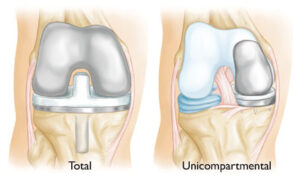Unicompartmental Knee Replacement
A unicompartmental knee replacement (UKR), also known as a partial knee replacement, is a surgical procedure that involves replacing only the damaged portion of the knee joint. This procedure is typically recommended for patients who have diseased portion in only one part of their knee joint. Unlike a total knee replacement, a unicompartmental knee replacement preserves the healthy parts of the knee joint, which can lead to faster recovery times and better long-term outcomes.
During UKR surgery, damaged tissue and bone in the knee joint is replaced with an artificial implant, called a prosthesis. Unicompartmental surgery is usually performed using techniques called minimally invasive surgery like arthroscopic surgery or reduced invasive surgery. It involves minor incisions, lesser bleeding and less bone than total knee replacement. This further reduces the recovery time.

Indications and contraindications for unicompartmental knee replacement
Indications for unicompartmental knee replacement include arthritis in only one part of the knee joint, a relatively young age, good bone quality, and an active lifestyle. Contraindications include arthritis in multiple parts of the knee joint, severe deformities, poor bone quality, and obesity.
Advantages and disadvantages
Advantages of UKR include less invasive surgery, faster recovery times, preservation of healthy knee tissue, better range of motion, and improved long-term outcomes. Disadvantages include the possibility of needing a revision surgery in the future, a higher risk of complications compared to total knee replacement, and limited coverage by some insurance plans.
Surgical technique
The surgical technique for unicompartmental knee replacement involves making a small incision in the knee, removing the damaged portion of the knee joint, and replacing it with an artificial implant. The surgery typically takes about one hour and can be performed under general or regional anesthesia.
Preoperative and postoperative care
Preoperative care includes a thorough evaluation by your surgeon to determine if you’re a good candidate for UKR, as well as preparation for surgery, such as stopping certain medications and arranging for transportation. Postoperative care includes pain management, rehabilitation exercises, and follow-up appointments with your surgeon.
Complications and risks
Complications of UKR include infection, blood clots, implant failure, and nerve damage. Risks associated with this procedure include the need for revision surgery, limited range of motion, and a higher risk of complications compared to total knee replacement.
Outcomes and long-term results of unicompartmental knee replacement
Outcomes of UKR include reduced knee pain, improved knee function, and better quality of life. Long-term results are generally good, with most patients experiencing relief of knee pain for 10 years or more.
Cost and insurance coverage
The cost of UKR surgery varies depending on the surgeon, hospital, and location. Insurance coverage also varies, with some plans covering the procedure fully and others only covering a portion of the cost. It’s important to check with your insurance provider to determine your coverage before proceeding with the surgery.
If you’re looking for the best unicompartmental knee replacement surgeon in Delhi, it’s important to do your research and find a surgeon with extensive experience and a good track record of successful surgeries. You can consult Dr. Biren Nadkarni, Senior Orthopedic Consultant & Surgeon, to know more about UKR, its procedure, and its outcome.
FAQs
-
What is unicompartmental knee replacement surgery?
Unicompartmental knee replacement surgery involves replacing only one part of the knee joint affected by degenerative disease, rather than the entire joint.
-
Who is a good candidate for unicompartmental knee replacement surgery?
Good candidates for unicompartmental knee replacement surgery are patients with arthritis limited to one compartment of the knee joint and who have not responded to non-surgical treatments.
-
How does unicompartmental knee replacement differ from total knee replacement?
Unicompartmental knee replacement replaces only the affected compartment of the knee joint, while total knee replacement replaces the entire joint.
-
What are the advantages of unicompartmental knee replacement surgery?
The advantages of unicompartmental knee replacement surgery include a smaller incision, less blood loss, faster recovery time, and a more natural feel to the knee joint.
-
What are the risks associated with unicompartmental knee replacement surgery?
The risks associated with unicompartmental knee replacement surgery include infection, blood clots, nerve damage, and implant failure.
-
How long does the surgery take?
The surgery typically takes 1-2 hours.
-
What is the recovery time after unicompartmental knee replacement surgery?
The recovery time varies, but most patients can return to normal activities within 3-6 weeks after surgery.
-
Will I need physical therapy after surgery?
Yes, physical therapy is typically recommended after unicompartmental knee replacement surgery to help improve range of motion and strengthen the knee.
-
Can I resume normal activities after surgery?
Most patients can resume normal activities, but high-impact activities such as running and jumping should be avoided.
-
What is the success rate of unicompartmental knee replacement surgery?
The success rate of unicompartmental knee replacement surgery is high, with most patients experiencing significant pain relief and improved knee function.
-
How long will the implants last?
The lifespan of the implants varies, but they typically last 10-20 years.
-
What is the cost of unicompartmental knee replacement surgery?
The cost of unicompartmental knee replacement surgery varies, but it is generally less expensive than total knee replacement surgery. You can consult Dr. Biren Nadkarni for the same.
-
Does insurance cover the cost of unicompartmental knee replacement surgery?
Insurance may cover the cost of unicompartmental knee replacement surgery, but it depends on your specific insurance plan.
-
Who is the best unicompartmental knee replacement surgeon in Delhi?
The best unicompartmental knee replacement surgeon in Delhi will vary depending on individual needs and preferences. Dr. Biren Nadkarni is considered one of the best unicompartmental knee replacement surgeon in South Delhi and Delhi NCR.
-
Where can I get unicompartmental knee replacement surgery in South Delhi and Delhi NCR?
Unicompartmental knee replacement surgery is available at various hospitals and clinics in South Delhi and Delhi NCR. It's important to research and choose a reputable facility with experienced surgeons.
